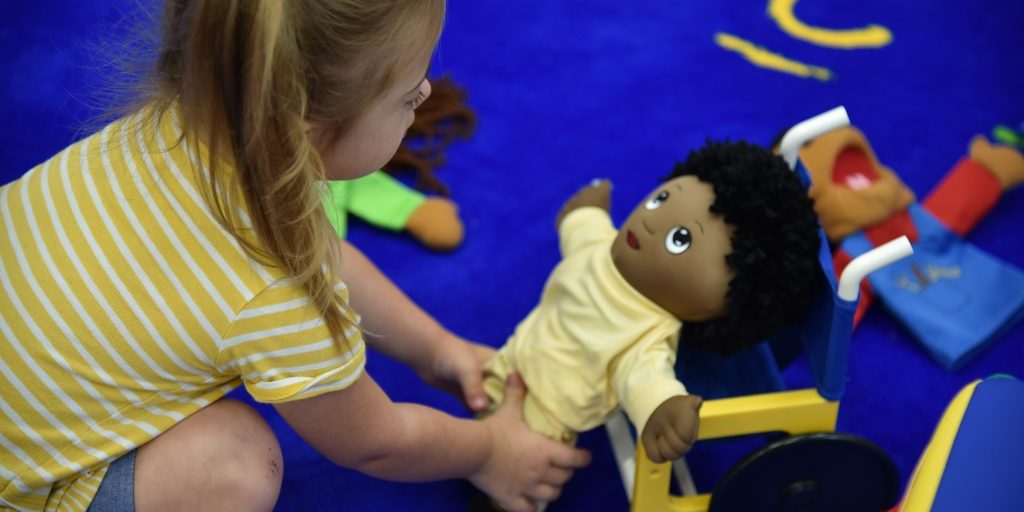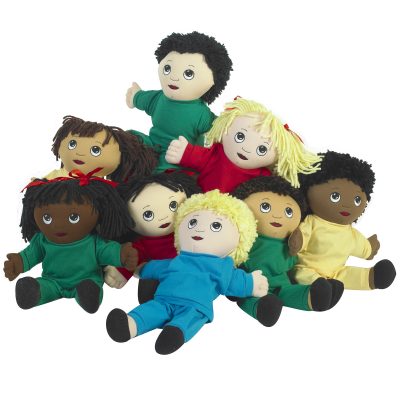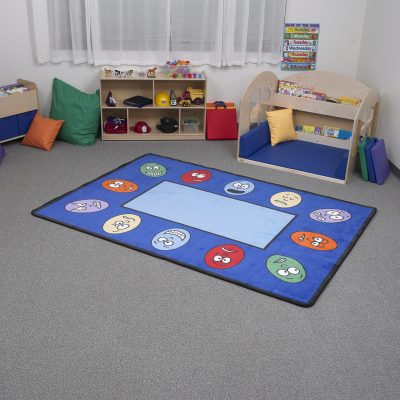
How to Use Pretend Play to Raise Compassionate Children?

Sweat Suit Dolls celebrate diversity.
Raising kids to be compassionate doesn’t usually happen by accident. Our Sweat Suit Dolls and Special Needs Accessories were designed to nurture these emotions and thought processes during pretend play so they become baked into a child’s DNA.
Pretend Play with a Purpose
Often, we think of pretend play as unstructured, fun time kids are given to let their imaginations run wild. There is nothing wrong with unstructured pretend play, it can also be structured to serve a purpose. Consider a providing littles with a play kitchen or a doctor or an astronaut costume. These accessories encourage kids to pretend to be a chef, an astronaut, or a doctor.
Similarly, when providing littles with special needs accessories for their dolls, it opens the door for teachers, caregivers, or parents to have a conversation with children about the importance of compassion.
Discuss Other People’s Feelings
For example: “Bobby looks very sad because you have not been sharing your toy animals with him. Why don’t you give him a few of your toy animals to play with so he feels better? Or maybe you could brighten his day by offering to play with your toy cars together?”
Suggest How a Child Can Show Empathy
When one of your child’s playmates skins a knee, suggest your child help by getting some ice to put on the other child’s boo-boo. Ask your child to pay attention to facial expressions. Many times, you can suggest a child share their snack to help someone feel better or offer a hug.
“I’m Sorry” Can Be A Hollow Phrase
Sometimes adults are too quick to prompt kids to say they are sorry. Do they mean it? Do they understand why they are saying sorry? Understanding cause and effect is pivotal for toddlers as they learn to take responsibility for their actions. A meaningful way to nurture empathy in a toddler is to help them focus on the other person’s feelings – not just on the words, “I’m sorry.” When focusing on feelings, one might say, “Nora, look at Chloe – she looks very sad. In fact, she is crying. She’s rubbing her arm where you pushed her. Let’s go check and see if she is okay. This will help kids make the connection between shoving (the action) and a friend being sad and crying (the effect).

FUNctional classroom décor, like our Expressions Rug (CPR438, CPR436, CPR437) helps kids identify facial expressions and learn to be compassionate.
Be A Role Model
Take your kids to a retirement facility or the cancer ward at Children’s Hospital to read some books, sing songs or pass out home-baked cookies to those who are less fortunate and hurting. Volunteer at a homeless shelter. Show kiddos the true meaning of compassion through your actions.
Don’t worry about exposing children to the harsh realities of life. Rather than being overly upsetting, the reverse is actually true. According to Christine Carter, Ph.D., a sociologist and happiness expert at the Greater Good Science Center at UC Berkeley, “When you expose children to the sufferings of others, they end up feeling grateful for what they have and proud of being able to help someone.”
Show Gratitude
 Parents and caregivers should always model gratitude. “When individuals have more gratitude, they are more likely to be generous and helpful in the future,” notes Sabrina Romanoff, PsyD, a Harvard-trained clinical psychologist at Lenox Hill Hospital in New York City. She advises parents to use the dinner table as an opportunity to model gratitude. Make it a ritual to have each individual share one thing from their day for which they are grateful. It reinforces an attitude of gratitude and opens the door for some great dinner conversations.
Parents and caregivers should always model gratitude. “When individuals have more gratitude, they are more likely to be generous and helpful in the future,” notes Sabrina Romanoff, PsyD, a Harvard-trained clinical psychologist at Lenox Hill Hospital in New York City. She advises parents to use the dinner table as an opportunity to model gratitude. Make it a ritual to have each individual share one thing from their day for which they are grateful. It reinforces an attitude of gratitude and opens the door for some great dinner conversations.

When was the last time you thanked a vet for his service?
Praise Kindness
When you notice your child sharing or showing kindness to another child, then don’t hesitate to dole out some praise. Just don’t overdo it. Overpraising a child can hinder them from becoming truly compassionate. They might start to focus more on the praise rather than other’s feelings and needs.
AMAZON LINKS:
CPR436 – Round Small Expressions Carpet
CPR437 – Round Large Expressions Carpet
Sweat Suit Doll – Hispanic Girl
Sweat Suit Doll – Caucasian Boy
Sweat Suit Doll – Hispanic Boy
Sweat Suit Doll – Caucasian Girl
Sweat Suit Doll – African American Boy
References: